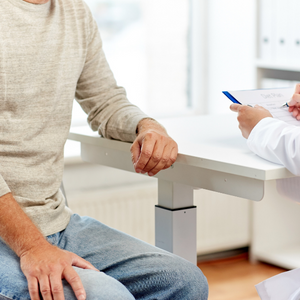Pouchitis

Pouchitis is a condition that affects the pouch that is created after surgery to remove the colon and rectum. Pouchitis occurs when the pouch becomes inflamed, which can cause symptoms such as abdominal pain, pelvic pain, diarrhea, and rectal bleeding.
Pouchitis is most commonly seen in people who have undergone surgery to treat inflammatory bowel disease (IBD), such as ulcerative colitis or Crohn’s disease. It is less common in people who have had surgery for non-inflammatory conditions, such as familial adenomatous polyposis (FAP).
Pouch surgery
During the surgery called total proctocolectomy, the colon and rectum are removed and the small intestine is rerouted to create the pouch. The pouch is connected to the anus, allowing the patient to use the pouch as a reservoir (similar to the rectum) and pass stools through the anus as they normally would.
The most common pouch created by surgeons is called J-pouch owing to its resemblance to the letter J. The surgery to connect the pouch to the anus is called ileal pouch-anal anastomosis (IPAA). An ileal pouch is typically recommended for patients with ulcerative colitis or familial adenomatous polyposis (FAP), a condition that causes the development of numerous polyps (small growths) in the colon and rectum. An ileal pouch may also be recommended for patients with other conditions that affect the colon and rectum, such as cancer.
There are also risks associated with the surgery itself, such as bleeding, infection, and adverse reactions to anesthesia. However, the benefits of pouch surgery, which is often performed to treat IBD, can be significant. Pouch surgery can provide relief from the symptoms of IBD, such as abdominal pain, diarrhea, and rectal bleeding, and can improve quality of life for people with IBD. Pouch surgery can also reduce the risk of colon cancer and other complications associated with IBD.
Treatment
The treatment of pouchitis often depends on the severity of the condition and the specific symptoms being experienced. In mild cases, treatment may involve the use of antibiotics to control the inflammation. Antibiotics that are commonly used to treat pouchitis include metronidazole, ciprofloxacin, and amoxicillin-clavulanic acid. In more severe cases of pouchitis, or in cases where antibiotics are not effective, other medications may be used. These may include immunosuppressants, such as azathioprine or 6-mercaptopurine, and biologics, such as infliximab or adalimumab. These medications can help to reduce inflammation and improve symptoms. In severe cases, pouch surgery may be necessary to remove the pouch and create a permanent ileostomy.
It is important for patients with an ileal pouch to follow a specific diet and take medications as prescribed to help prevent problems with the pouch. The pouch may need to be examined periodically with a procedure called a pouchoscopy to check for any problems. The main risk of pouchitis is the potential for long-term inflammation of the pouch, which can lead to a range of complications, including abdominal pain, diarrhea, and weight loss.
FAQs
Symptoms of pouchitis may include abdominal pain, diarrhea, rectal bleeding, and weight loss
Pouchitis is most commonly seen in people who have undergone surgery to treat inflammatory bowel disease (IBD), such as ulcerative colitis or Crohn’s disease. It can also be caused by infection or the use of certain medications.
Pouchitis is typically diagnosed based on the presence of symptoms and confirmed through a combination of medical history, physical examination, and diagnostic tests, such as blood tests, stool samples, and imaging studies.
Treatment for pouchitis may include antibiotics, immunosuppressants, biologics, and surgery. The specific treatment plan will depend on the severity of the condition and the specific symptoms being experienced.
There are no guaranteed ways to prevent pouchitis, but there are some things you can do to reduce your risk, such as maintaining good hygiene, avoiding foods that may irritate the pouch, and avoiding tobacco and alcohol. Probiotics may help prevent pouchitis.
Pouchitis can often be effectively managed with the right treatment plan, but it is not always curable. In some cases, pouchitis may be a long-term condition that requires ongoing treatment.
No, pouchitis is not contagious. It is a condition that affects the pouch, which is a surgically created structure
If left untreated, pouchitis can lead to a range of complications, including malnutrition and weight loss.
In some cases, pouchitis may be a sign of a more serious underlying condition, such as Crohn’s disease. It is important to speak with a healthcare provider if you are experiencing symptoms of pouchitis.